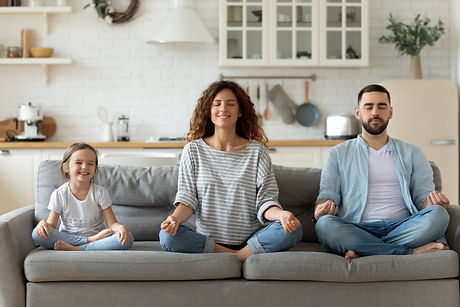Mindful Anxiety Management
Anxiety is by far the most prevalent mental health crisis faced by people in our modern world. It is oftentimes created by the high-paced, over-committed, demand for perfection lives that we’re forced to lead in order to keep up with culture that we live in.
While self-care and stress management are essential to manage anxiety, systemic change as well as perspective change related to what’s really important are needed in order to truly free ourselves from crippling anxiety.
Anxiety is a complicated knot. The anxious brain cannot contemplate the social and lifestyle changes necessary to alleviate the systemic roots of anxiety when we’re actively experiencing anxiety.
Scroll to find tools to help calm the anxious brain and body. Start the process of breaking free from the knot of anxiety in your life.
We each experience anxiety in our own unique way and will experience relief from our anxiety just as uniquely. What works for one person may not work for another. Try out different and new strategies to see what helps you best.
Aim for daily implementation of at least one of the strategies below.

Therapy
If anxiety or panic is regularly impacting a person’s life, a mental health professional can offer support, reassurance, and advice. Therapy can help a person discover the causes of their anxiety and help them develop effective coping methods.
Therapy, incorporating elements of CBT (Cognitive Behavioral Therapy), is effective at managing Anxiety and Panic Disorders. CBT teaches tools to reduce stress and to increase a person's tolerance to anxiety producing situations.
All of our therapists at Simply Mindful Counseling are trained in CBT, Mindfulness, and other strategies used to manage anxiety.

Breathing Exercises
Learning to practice slow, deep breathing as a general relaxation method outside of panic attacks makes it easier to practice deep breathing during an attack. Breath in through your nose and out through your throat as if you are breathing out all of your stress with a long sigh.

Aromatherapy
Smelling soothing plant oils can help to ease stress and anxiety. Certain scents work better for some people than others, so consider experimenting with various options. According to a small study, Lavender may be especially helpful for anxiety.

Talk to a Friend
Social support and healthy social outlets can ease a person’s anxiety and make them feel understood and less alone.

Exercise
Exercise can help promote deeper sleep, get rid of built-up tension, and produce endorphins, which make the person feel happier and more relaxed.

Lifestyle Changes
The following lifestyle changes help reduce anxiety:
-
Avoid or reduce smoking
-
Avoid or reduce alcohol intake
-
Avoid or reduce caffeine intake
-
Following a healthy diet
-
Get 7-9 hours of sleep at night
-
Stay hydrated

Meditation
Regular meditation is a great way to relieve stress, promote peacefulness, and regulate breathing. Research shows that Mindfulness-based therapy that encouraged the therapeutic use of meditation can help to slow racing thoughts, making it easier to manage stress and anxiety.

Herbal Treatments
Throughout history, people have used herbs to treat anxiety and depression. Some of the most popular herbal remedies include kava extract, passiflora, and valerian.
Research into the effects of herbal remedies is ongoing. People should always speak to a doctor before using herbal remedies as they can interfere with pharmaceutical treatments.

Progressive Muscle Relaxation Exercises
Some people unconsciously tense their muscles and clench their jaws in response to anxiety. Progressive muscle relaxation exercises can help.
Try lying in a comfortable position and slowly constricting and relaxing each muscle group, beginning the toes and working up to the shoulders and jaw.

Cannabidiol Oil
Cannabidiol (CBD) oil is a derivative of the cannabis, or marijuana, plant. Unlike other forms of marijuana, CBD oil does not contain tetrahydrocannabinol, or THC, which is the substance that creates a “high.” CBD oil is readily available without a prescription in many alternative healthcare shops. Preliminary research suggests that it has significant potential to reduce anxiety and panic.

Journaling
Finding a way to express anxiety can make it feel more manageable. Journaling and other forms of writing can create an outlet and help a person cope better with anxiety.

Time Management Strategies
Most of us feel anxious if we have too many commitments at once. Resist the urge to over commit and to multitask. When your days are busy create a schedule and write everything down. Having a plan and focusing on only one task at a time can help keep anxiety at bay.
Book-based planners, online calendars, task lists, sticky notes, and family calendars can help with time management.
Most people find that breaking major projects down into manageable steps can help them to accomplish those tasks with less stress as well.

Herbal Teas
Many herbal teas promise to help with anxiety and ease sleep. Some people find the process of making and drinking tea soothing, but some teas may have a more direct effect on the brain that results in reduced anxiety. Results of a small 2018 trial suggest that chamomile can alter levels of cortisol, a stress hormone.

Time with Animals
Caring for a pet and spending time with animals offer companionship, love, and support. Research confirms that pets can be beneficial to people with a variety of mental health issues, including anxiety.

Ask for Help
If your anxiety, fear, or worry continues to cause such distress in your life where you’re unable to function as your best-self despite implementing the natural strategies listed above, then medication may be a necessary option, if only temporarily.
Only your doctor or a psychiatrist can prescribe medication. Generally, the following medications are used:
-
anti-anxiety medications called benzodiazepines
-
anti-depressants called SSRIs (selective serotonin re-uptake inhibitors)
-
sleeping medications, if anxiety interferes with sleep
